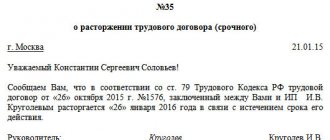Author: I. G. Silko
What grounds for concluding a fixed-term employment contract are established by law? Can it be concluded on other grounds? What are the rules for concluding such an agreement by agreement of the parties? What are the signs of the legality of concluding a fixed-term contract? When does it terminate? In what cases can you not fire a conscript employee?
Concluding an employment contract for a certain period is quite convenient for the employer, since upon termination of the employment relationship no special grounds for dismissal are needed. For an employee, on the contrary, in most cases this is a necessary measure.
Nevertheless, the Labor Code establishes quite a lot of grounds for concluding a fixed-term employment contract. And if the employer still “lacks” the grounds and concludes such an agreement in violation of the law, as a result, the employee may be reinstated after dismissal, and the agreement may be reclassified as permanent.
In the article we will consider in which cases the conclusion and termination of a fixed-term employment contract is legal, and in which it can be considered illegal.
Articles on the topic (click to view)
- What to do if the employer does not give the employment contract
- What is the difference between a collective agreement and an employment contract?
- Apprenticeship contract with an enterprise employee: sample 2020
- Terms of remuneration in an employment contract: sample 2020
- Go on maternity leave from the labor exchange
- Notice of extension of a fixed-term employment contract: sample 2020
- Notice of termination of a fixed-term employment contract: sample 2020
Grounds for termination of a fixed-term contract
By virtue of Art. 79 of the Labor Code of the Russian Federation, a fixed-term employment contract is terminated upon expiration of its validity period. In this case, an employment contract concluded:
- for the duration of certain work, - terminates upon completion of this work;
- for the duration of the duties of an absent employee - terminates when this employee returns to work;
- to perform seasonal work during a certain period (season), - terminates at the end of this period (season).
The employee must be notified in writing of the termination of the employment contract due to its expiration at least three calendar days before dismissal, with the exception of cases where a fixed-term employment contract concluded for the duration of the duties of the absent employee expires.
Expert opinion
Lebedev Sergey Fedorovich
Practitioner lawyer with 7 years of experience. Specialization: civil law. Extensive experience in defense in court.
Of course, a fixed-term contract can be terminated ahead of schedule in cases established by the Labor Code of the Russian Federation, but we will consider specifically the termination of employment relations due to the expiration of the contract.
Dismissal of an employee is unlawful
The dismissal of an employee due to the expiration of the employment contract is illegal, as already noted, if the contract was concluded unlawfully, in particular, when there were no legal grounds for this, the term of the contract and the circumstances (reasons) that served as the basis for its conclusion were not indicated, as well as the employee did not give consent to conclude an agreement by agreement of the parties in accordance with Part 2 of Art. 59 of the Labor Code of the Russian Federation and was able to prove this.
In addition, dismissal will be unlawful if the event associated with the termination of the employment contract has not occurred and the employee has already been fired. The employer has the right to dismiss an employee only if the event that determines the expiration of the contract has occurred.
If the court finds that a fixed-term employment contract was concluded unlawfully, it can be reclassified as concluded for an indefinite period and the employee can be reinstated.
Dismissal due to the expiration of the employment contract of a pregnant employee is permitted if the contract was concluded for the duration of the duties of the absent employee, and the woman cannot be transferred with her written consent to another job available to the employer until the end of her pregnancy. In other cases, the employment contract is extended based on the employee’s application until the end of pregnancy or maternity leave (Parts 2, 3 of Article 261 of the Labor Code of the Russian Federation).
In any case, if the contract was concluded for the duration of the duties of the absent employee, there is no need to warn about termination of the contract.
Thus, we can identify the main reasons when dismissal due to the expiration of the employment contract will be illegal.
Dismissal due to the expiration of the employment contract is unlawful if...
…there are no legal grounds for concluding a fixed-term contract
...there is no written form of the contract (an exception is possible if the employee signed an order with a specified validity period of the contract)
...the contract does not indicate its validity period
...the contract does not indicate the circumstances that served as the basis for its conclusion (the exception is when these circumstances do not raise doubts, for example, if the employee is a pensioner)
...the fixed-term contract was concluded under duress
...the employee is fired before the occurrence of an event that determines the expiration date of the employment contract
...a pregnant woman is fired, and she writes an application to extend the contract
...a pregnant employee, with whom the contract was concluded for the duration of the duties of an absent employee, was not offered a transfer to another position
We talked about what to look for when concluding a fixed-term employment contract, what causes such a contract to be recognized as indefinite, as well as the most common cases when the dismissal of a “fixed-term” employee can be considered illegal. In this situation, the employer will have to not only reclassify the employment contract as permanent and reinstate the employee, but also pay him the average salary for the period of forced absence, compensation for legal costs and moral damages. We hope that you will take all of the above into account when concluding fixed-term employment contracts. The most important thing is to apply only the grounds provided for by law. And of course, the agreement of the parties to set a deadline in accordance with Part 2 of Art. 59 of the Labor Code of the Russian Federation can only be voluntary.
This is important to know: Agreement of the parties on termination of the employment contract: sample 2020
Position of the Constitutional Court of the Russian Federation: the term of an employment contract cannot depend on civil law
When considering this case, the Constitutional Court, first of all, recalled the weaker position of the potential employee in relation to the employer. Lack of work, the need for a means of subsistence and the general state of the labor market often forces a citizen to agree when applying for a job to conditions that are obviously unfavorable for him, offered by the employer. These conditions also include the urgent nature of the employment relationship, the court noted.
According to the Constitution, state policy should be aimed at ensuring a decent life and free development of people. A necessary condition for achieving these goals is stable employment, which is not guaranteed when concluding fixed-term employment contracts. Largely because of this, cases of using fixed-term employment contracts are limited by law, the Constitutional Court explained.
One of these cases is enshrined in paragraph. 8 hours 1 tbsp. 59 of the Labor Code, which was used in this case. We are talking about performing a clearly defined job, the completion of which cannot be determined by a specific date.
note
However, as the Constitutional Court noted, the conclusion of a fixed-term employment contract on this basis will be legal only if the work itself is final, and in this sense, urgent. That is, the continuation of the employment relationship after the completion of such work should be impossible.
The expiration of the civil law contract between the employer and the customer, as a rule, does not indicate that the employee has completed his work, the resolution says. The employer’s obligation to provide work involves, among other things, the timely conclusion of new contracts with other organizations. If it is impossible to conclude them and provide work, he is obliged to pay his employees for downtime.
If the duration of the employment contract is made dependent on the duration of the employer’s contract with a third party, then the employee automatically bears the risks that are inherent in entrepreneurial activity. This approach, according to the Constitutional Court, distorts the essence of labor relations.
note
Linking the term of the employment contract concluded with the employee with the validity period of the contract for the provision of paid services concluded by the employer with a third party would actually lead to the fact that the employee’s employment would be made dependent solely on the result of the agreed expression of will of the employer and the customer of the relevant services regarding the very fact of concluding an agreement between them paid provision of services, its validity period and extension for a new period. Thus, the employee would be forced to share with the employer the risks associated with the economic activity carried out by the employer in the field of relevant services (including those associated with fluctuations in demand for these services), which would lead to a distortion of the essence of labor relations and an imbalance of the constitutional rights and freedoms of the employee and employer.
The contested provision of the Labor Code of the Russian Federation does not contradict the Constitution to the extent that it does not imply the formation of a fixed-term employment relationship with an employee solely on the basis of a limited period of validity of the employer’s contract with the customer, the court decided. This is especially true if, as in the case of a security guard, we are talking about multiple conclusions of fixed-term employment contracts. The repetition itself, according to the court, indicates the absence of objective obstacles to concluding labor relations for an indefinite period. A different understanding would allow employers to unjustifiably terminate employment relationships and dismiss workers in a simplified manner, without providing them with guarantees and compensation, the Constitutional Court noted, obliging them to review the decisions in the case.
The court decision is in favor of the employee
An employment contract was concluded between the plaintiff (employee) and the defendant (employer), according to which the plaintiff was hired for a certain term of the employment contract - the start and end date of work. Several additional agreements were drawn up and signed by both parties to the employment contract, according to which the employee’s position, place of work, and salary were changed. Subsequently, the employer terminated the employment contract in question - on the basis of clause 2 of Article 77 of the Labor Code of the Russian Federation - due to the expiration of the term.
The plaintiff could not agree with this decision of the employer and filed a lawsuit. In the statement of claim, he demanded that the employment contract be recognized as concluded for an indefinite period, that the order to terminate the employment contract due to the expiration of the contract be declared illegal, that he be reinstated in his previous position, and that appropriate payments and compensation for moral damage caused be made.
In turn, the employer company did not recognize the claim, arguing its position that the basis for concluding a fixed-term employment contract with the plaintiff was the conclusion of a state contract for comprehensive maintenance of water supply systems, associated with a deliberately temporary (up to one year) expansion of the volume of services provided. The duration of this government contract was determined by a specific date. One of the additional agreements to the employment contract contained a reference to the state contract as the basis for concluding a fixed-term employment contract. The employer considered paragraph 6 of part 1 of Article 59 of the Labor Code of the Russian Federation to be the legal basis for its position in court: “for carrying out work related to a deliberately temporary (up to one year) expansion of production or the volume of services provided.”
After analyzing the presented materials, the court satisfied the employee’s claim, immediately reinstating him at work.
Unobvious possibilities for filing a claim for missing the statute of limitations
You can win even the most difficult dispute with an employee if you promptly declare that he has missed the statute of limitations. If the deadline is missed, then there will be no problems, but there are situations when even judges do not understand at what point the deadline begins. The most complex disputes are about the recognition of a civil contract as an employment contract and about the reclassification of a fixed-term contract into an open-ended one. Labor lawyer for organizations Our services
Our lawyers will help in resolving issues related to labor disputes! The practice of the Bar Association “Gribakov, Polyak and Partners” in Moscow has a large number of successful cases. Contact us.
Missing a deadline is a universal way to win a dispute if the company’s position is not strong enough. In most cases, the Labor Code of the Russian Federation clearly defines how to calculate this period. However, there are some categories of disputes when it is difficult to say unequivocally that the employee missed the deadline, since it is unclear from what moment it begins. Such difficulties arise when challenging a civil or fixed-term employment contract. In court, the employees insist that the employer had no legal grounds for concluding a civil or fixed-term contract. And if the demands are justified, the court will most likely satisfy the employee’s claim and reinstate him at work.
In these disputes, it is often unclear at what point the employee learns of a violation of his right, and, therefore, the period for going to court begins to run. There are two main points of view. The first is counted from the conclusion of the contract, the second - from the moment of its termination. And if there should be no problems with civil contracts - the courts adhere to the first option, then in relation to challenging fixed-term contracts, the court can support both the company and the employee. You can convince the court of the correctness of your position based on how the employee formulated the claims. If his main requirement is “to recognize the employment contract as indefinite,” the court will most likely consider that he learned about the violation of the law precisely at the moment the contract was concluded.
What mistakes did the employer make?
The employer was unable to prove the short duration of the employment relationship. The decisive arguments in favor of the employee in the case under consideration for the court were the following:
The place of work of the plaintiff-employee was the defendant's branches, a permanent structural unit of the company (financial department), which cannot in any way indicate the temporary nature of his work.
An extract from the Unified State Register of Legal Entities, the Charter, and other constituent documents of the legal entity indicated that the main type of economic activity was precisely those services that were provided in pursuance of government contracts. The specified production activity is the main one, and therefore constant for this company.
The repeated conclusion of various additional agreements with the extension of the term of the employment contract was assessed by the court as a production necessity for the employee to perform his labor functions on an ongoing basis, and transfers and promotions - on the usefulness of the employee’s activities, its value, and the need for his services.
The defendant did not provide any evidence that the work performed by the plaintiff was necessary for him within a certain period. The plaintiff’s total work experience in the company is significant – 4 years.
So, despite the fact that the agreement was voluntarily signed by both parties and contained a condition for a certain period of validity, in this court case the court sided with the employee and satisfied his claim to recognize the employment contract as unlimited, and the employer incurred unplanned financial expenses associated with this.
What else needs to be considered?
In addition to the above violations, which most employers commit when concluding temporary employment contracts, others can be identified. They are found in the vast majority of court cases on the recognition of a fixed-term employment contract - concluded for an indefinite period:
In the work book of the plaintiffs (employees), when making a record of hiring, there is no entry indicating that the employee was hired specifically under a fixed-term employment contract (temporarily).
The employer does not have adequate evidence of the employee’s voluntary consent to a fixed-term employment contract:
Expert opinion
Lebedev Sergey Fedorovich
Practitioner lawyer with 7 years of experience. Specialization: civil law. Extensive experience in defense in court.
grounds for concluding a fixed-term employment contract with appropriate references to Article 59 of the Labor Code of the Russian Federation (they must be indicated in the contract);
a personal application for hiring an employee must contain his/her will to enter into a temporary employment period;
the documents do not contain the express will of the parties. If consent to conclude an employment contract was given by the employee involuntarily, then it is not voluntary; in this case, the court applies the rules of an agreement concluded for an indefinite period (Determination of the Constitutional Court of the Russian Federation dated May 15, 2007 N 378-O-P.).
This is important to know: How to make changes to an employment contract
The employee’s personal application for employment does not reveal a voluntary expression of will to conclude an employment contract with the employee - on a specific basis, for example, as an old-age pensioner.
The staffing table confirms the presence in the company of positions and departments with identical labor functions, goals and objectives as the plaintiff, but with employment contracts concluded for an indefinite period. Thus, the court finds a violation of the labor rights of the employee whose employment contract has a fixed term in comparison with others.
A job description for an employee, the content of which identifies a specific job function within the framework of the normal permanent business activities of the employing company, which has no signs of a temporary nature.
Repeated conclusion of short-term employment contracts to perform an identical job function for the same position (with the exception of seasonal work). If such a fact is established during the consideration of the court case, the court with a high degree of probability, taking into account other evidence in the case, recognizes the employment contract as concluded for an indefinite period.
Work in the position in which the dismissed employee worked continues to this day (after the termination of the controversial employment contract, the position was not excluded from the staffing table; a new employee was hired to perform identical job duties).
The court may also take into account the performance of other job duties by a temporary employee during his or her employment, or the assignment of work at other company facilities, confirmed by the case materials.
There is no documentary evidence or information about the urgent project, about the completion time of the project or work on the basis of which the fixed-term employment contract was concluded, as well as information about the plaintiff’s familiarization with them in relation to the employee’s labor function.
If neither the employee nor the employer initiated the termination of the concluded fixed-term employment contract within the period established by him, while the employee continues to perform work after the expiration of this period, the condition on the fixed-term nature of the employment contract loses force, and the employment contract is automatically considered concluded for an indefinite period. HR department employees should monitor the terms of employment contracts and promptly terminate such employment contracts in accordance with the requirements of labor legislation.
The responsibility for proving the existence of grounds for concluding an employment contract for a certain period rests with the employer; it is he who must justify and provide evidence that the conclusion of a fixed-term employment contract was carried out in full compliance with the letter of the law, as well as what determines the impossibility of concluding an open-ended employment contract.
Lawyers' opinion
The situation faced by the Tomsk security guard occurs quite often in practice. Employers often enter into fixed-term employment contracts with employees precisely on the basis of paragraph. 8 hours 1 tbsp. 59 Labor Code of the Russian Federation. They justify the application of this provision by the “project” nature of the work. That is, a civil law agreement between the employer and the counterparty was concluded specifically for it.
How many companies are ready to give their employees for temporary use?
Read more…
This basis is often used in the construction industry, when builders and other specialists are hired to construct a specific object, but it is impossible to determine the exact completion date of the construction, so a fixed-term employment contract is concluded with them to perform a clearly defined job, the completion of which cannot be determined by a specific date. .
note
An organization cannot enter into fixed-term contracts with employees only on the basis that it has concluded contracts with customers for a certain period. In addition, the fact that fixed-term employment contracts are concluded multiple times to perform work for the same position (profession, specialty), as a rule, , indicates the absence of circumstances that objectively prevent the establishment of labor relations for an indefinite period.
To para. 8 hours 1 tbsp. 59 of the Labor Code of the Russian Federation often resort to “outsourcing” companies that enter into fixed-term employment contracts with employees for the provision of a specific service and provide personnel to their counterparties under a service agreement.
A number of workers in different regions tried to challenge fixed-term contracts concluded for “project” work, but the practice of courts of general jurisdiction was stable: the courts recognized the conclusion of a civil contract with a third party as an appropriate basis for formalizing a fixed-term employment relationship with an employee who will work within this civil contract. In the case of the Tomsk security guard, the courts of general jurisdiction most likely took a formal approach as a basis: since the employee signed, it means he agreed and knew what he was getting into. This is a fairly common argument among courts.









